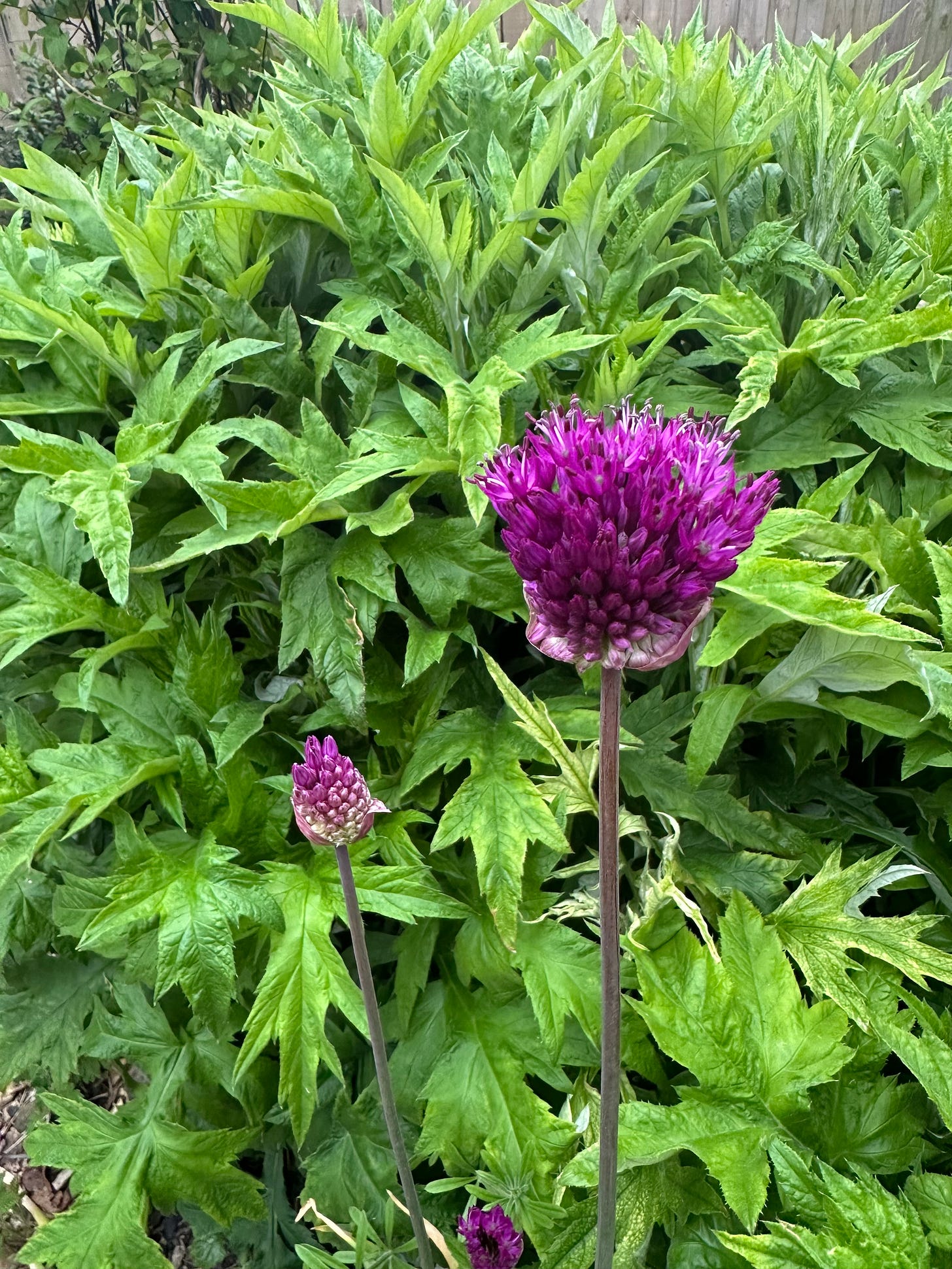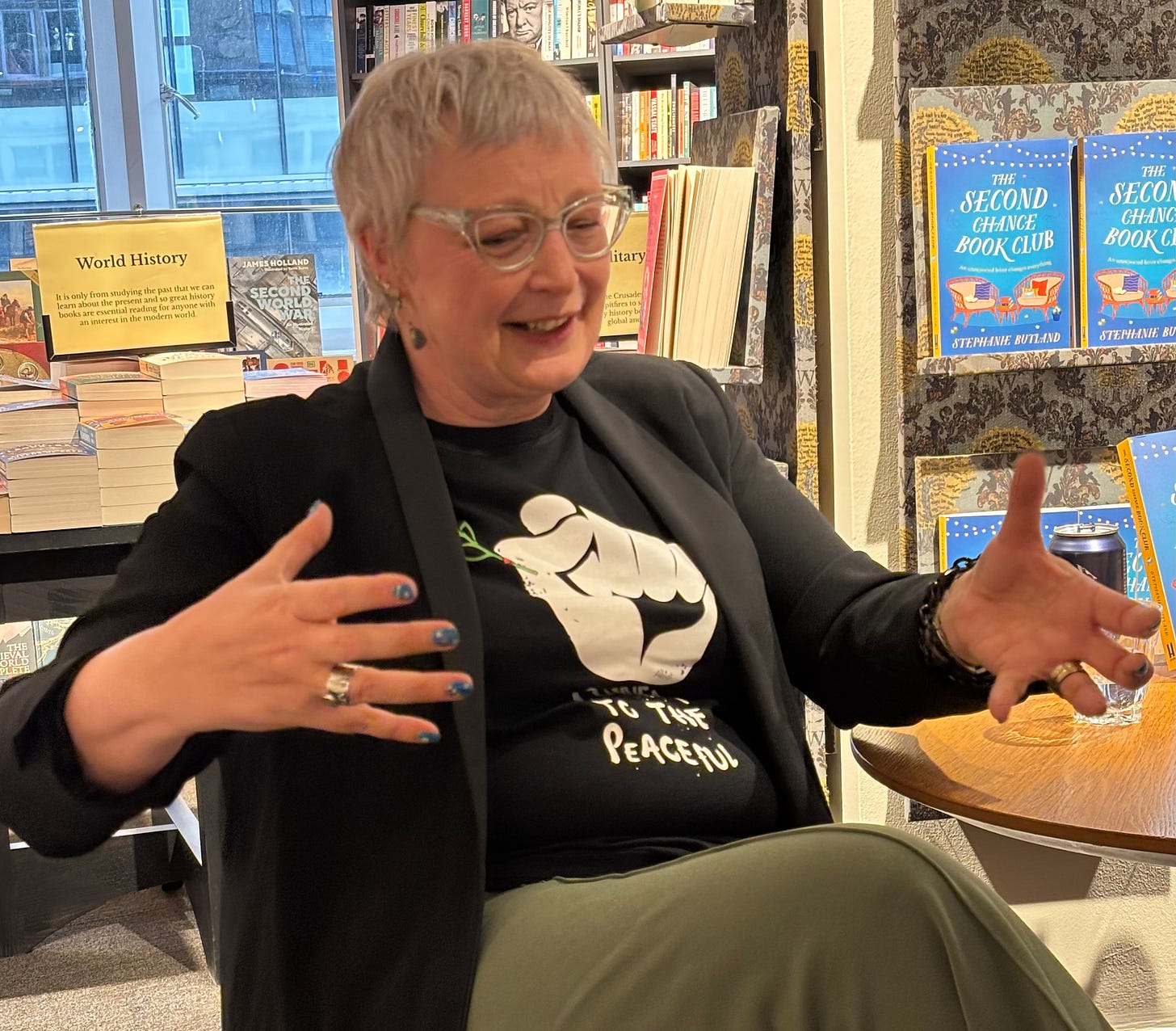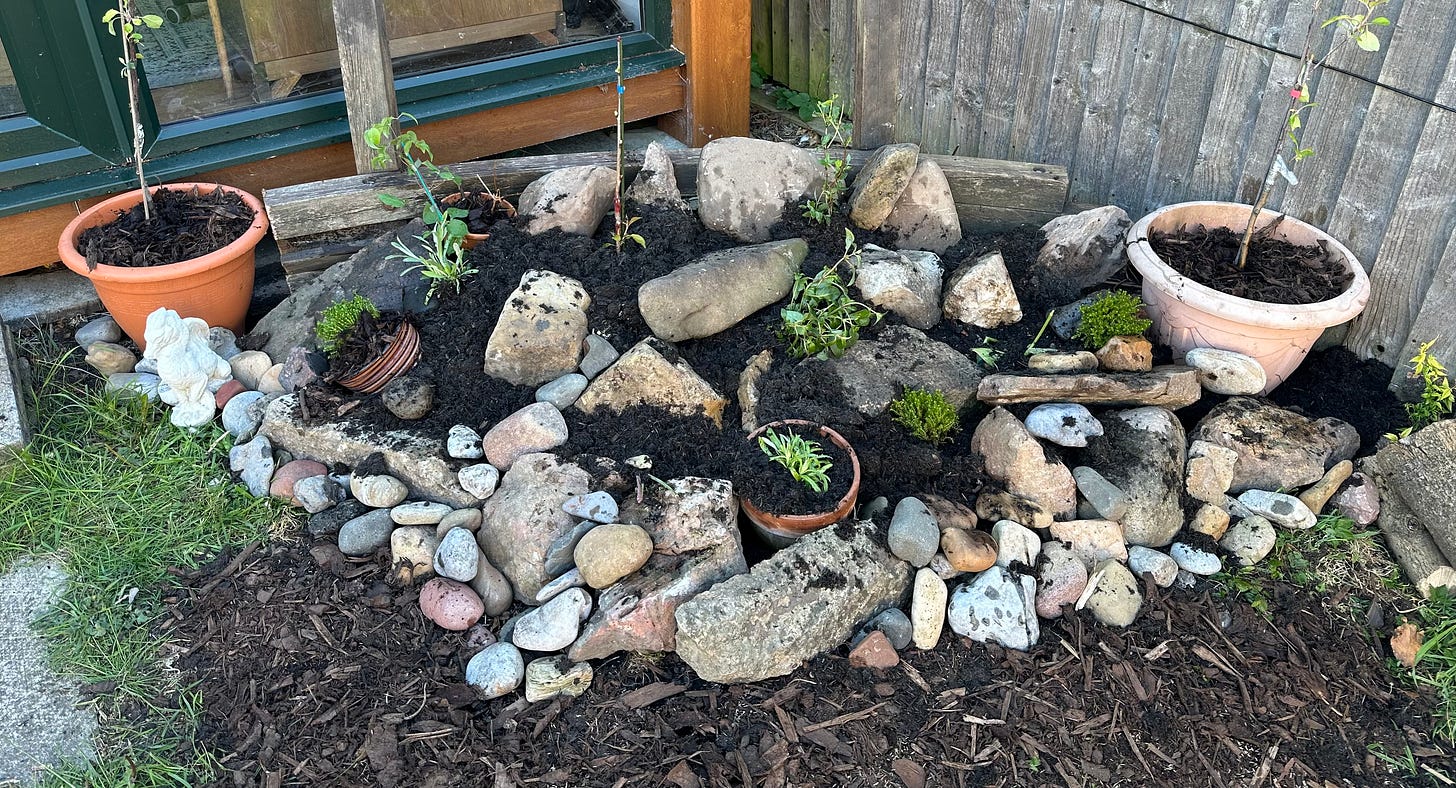The mermaid draft, out and about, and a lot of rocks.
Approximately-weekly news, #50
First of all, thank you for the love for my post about becoming a Quaker. I wasn’t sure what to expect. I got a thoughtful, loving wave of messages that made me feel held. It means a lot.
As you have probably noticed, I’m mainly about snowdrops and tulips, flower-wise. But in May, when the aliums (alia? alium as a plural, like sheep and sheep?) come, I do consider changing my floral allegiance. One day there’s nothing; the next, stems two feet high, and this morning, the purpling promise. (I was going to say ‘head of purpling promise’ but… well. I will save that for when I start writing medieval erotica.)
‘The Second Chance Book Club’ had its first Official Event last week. I have no idea what I was talking about here. Possibly bread making. (Let’s hope it wasn’t medieval erotica. I will never be invited to Waterstones again.)
I really like the moment when a book gets to go out in the world. Even though there are sales figures (thank you), and plenty of reviews (thank you again) - somehow, it’s not until I sit in a bookshop with a copy of my novel in my hand that I think, ‘oh, it *is* real.’ (There is a part of me that regularly suspects I have imagined my entire writing career.) I was interviewed by Victoria, who is just so good: she thinks deeply about what she asks, and so we talked about writing, about dogs, about poverty, about locations, about reading aloud. I confessed that I have never been able to listen to an audiobook without falling asleep.
I’ve got a few events coming up - it would be fantastic to see you. (It’s a good idea to book ahead, because no-one wants a bookshop to run out of wine.) I’m in:
Alnwick next Wednesday, 21st May
Wetherby on Saturday, 14th June
Yarm on Friday, 27th June
I’m working on the second draft of my next novel (out in 2026). This is the version where it all comes together*. In the first draft, I have a sense of the story and I’m feeling my way. I’m also changing my mind as I learn more about the story I want to tell. I tend to write in a linear way - chapter one, and off we go until we get to the end. (Though I never type ‘The End’; I’m not sure why not. I suppose I hope it’s obvious.) This means that if a major character in chapter one is an architect named Suzanna, but in chapter nine I decide that the story will be better served/more interesting if she is a signwriter named Jo-Marie, then I write on to the end with Jo-Marie. When I get to the next draft, I fix all the Suzanna references, which might mean small changes or might be major ones, depending on the extent to which Jo-Marie’s character is involved. I once wrote a novel in which the main character was cripplingly shy. When I realised the story would work much better if she was forthright, everything improved - but there was a lot to do in the next draft of the first half. We might think of this as the mermaid draft: starts as one thing, ends up another.
(Unless, of course, you were setting out in the hope of a mermaid, which John Waterhouse Williams presumably was here.)
I always really love working on the draft-after-the-mermaid. There’s a sense of enrichment as I write; and making things link up sparks something in my imagination and generates the small details that make a novel come alive. This is the time at which I behave most like a writer. I wake up in the morning to find that I have written ‘do you turn red if you eat too many cherries?’ on one of the post-its I keep next to my bed. When I’m driving, I’ll call BMB** (on hands-free) and say, ‘Please write this down: the vintage fair needs to come before the woodland.’ I write the barest outlines of new scenes because my brain is going faster than my fingers. (One day I will learn to touch-type***.) It’s a complicated process, in terms of many moving parts, and I’ve learned to go slowly and keep notes, rather than hop around in a manuscript.
There is always a part of me, too, that thinks this novel will never be any good, that it’s boring and I’m missing something, that what is interesting to me will be met with bafflement and disappointment by my editor. But part of writing life, for me, is feeling these feelings and going ahead anyway; trusting what I’ve done, knowing that imposter syndrome and all of her little friends like nothing more than creeping up on a busy writer and trying to make her stop.
If you’re a writer, and the paragraph above hasn’t made you run screaming to a more sensible substack, you might be interested in the work I do with writers at any stage of their careers. Find out more here, and then message me and we’ll arrange a no-obligation chat. I’m booking into the autumn now; slots go fast.
I have been building a rockery, and assembling a toolshed, and generally continuing to behave like a woman with a garden. This is my actual lilac which I actually planted. I also banged that willow mini-fence in with a borrowed mallet. (My first go at malleting, as you may be able to tell.)
To clarify: I have been a woman with a garden for fifteen years - nearly thirty, if you count the previous garden, which I didn’t, because it was out the back of the house and I never had to look at it. But I’ve been bare-minimuming this garden business for a long time. Not any more. Suddenly, I like gardening, or at least find it comforting. (My friend Lou was a great one for a garden.)
As I was pootling about encouraging edelweiss and hebe into the gaps in the rocks (I’m not sure if this is how you actually do a rockery but this is how I am doing it) I had a thought about why I’ve never really bothered with gardening before. I think it’s because a garden is never finished. Or if it is, it doesn’t stay finished for long. I have always seen this as a reason not to garden. Now, I think it is exactly why I should. After all, so many things are never finished. Conversations, friendships, plans keep on growing. It doesn’t make them any less important.
(Note to myself, three weeks from now, pawing through post-its and trying to remember why I even started this: novels definitely need to be finished. YOU CANNOT WRITE THE MEDIEVAL EROTICA UNTIL YOU FINISH THIS ONE.)
As the poet and novelist, May Sarton, wrote:
Everything that slows us down and forces patience, everything that sets us back into the slow circles of nature, is a help. Gardening is an instrument of grace.
Here is the rockery. Which, metaphor-wise, is not a million miles from the current state of my novel. Structurally sound, in need of colour, quite a few gaps to fill.
That’s it for this week. I hope that you are well. Take good care of yourself.
Until next time,
Stephanie x
*I had to make a big effort not to make a self-deprecating joke here. ‘or at least I hope it will/by some miracle/etc’. I am mindful of the young women writers I know, who I want to encourage to own their successes and their talents. Bloody patriarchy, though.
**For the benefit of new subscribers, Beloved Mr Butland
***No I won’t.







